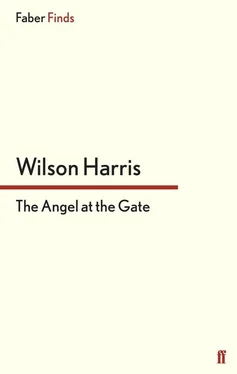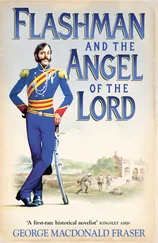The cosmos had been moved a faint inch or two. The planet Bale was affected. A skull-like formation of rock presided there called Rudimentary Brain from earth where it had been first sighted by an amateur astronomer from Angel Inn. Now the shock of cosmic tenderness and ruthlessness awakened a fire on Bale. Fire was the mind of nature in space. Fire was subtle conversion of nature in space. It became the womb of the brain or the rock on Bale.
Indeed the tremor had shaken Mary’s diminutive cosmos. An ocean had filled a bath when she travelled to India. Now a bale or loaded box from a lorry became a planet. Mary repaired to Angel Inn in the afternoon to find Marsden ill and in bed. He had suffered a shock. In turning a corner, a lorry had overturned that morning and flung a train of bales on to the ground. One narrowly missed Father Marsden before it ploughed into a gate. Was it a meteor from Mother Diver’s shawl? It had happened within a stone’s throw of the supermarket.
Mary sat, quiet as a mouse, by the great four-poster on which Joseph lay. He looked all at once very ill. His black, greying beard lay against his chest and white roughened skin. And for a flashing moment — faint inch moving the cosmos — Mary was reminded of Sebastian’s hollow tree of a body.
“Nothing serious,” Joseph said. “A very minor heart attack. More shock than anything else. They did not even worry to keep me in hospital. As you see I’m here….”
But he was dying. She knew. Bath, bale, hollow tree and other functions of negative capacity or capability became elements in a progression neither comic nor tragic, the diminutive funeral of an age, not large-scale imperial funeral, jet-planes flying overhead, tanks on land, warships at sea, but precarious Utopian utensils in which to store water and food for the baptism of the small soul and the nourishment and protection of the dying body. That a bale, the container of choice dates, silks, clothing, had functioned as a deadly meteor was the unsmiling humour of the Diver woman.
Marsden tried to laugh it away but as he looked at Mary his eyes were grave. It was an immensely difficult task — whether as the ex-priest or the ex-dialectician that ancient Joseph Marsden was — to face his departure, his coming death, in the light of the aroused kingdom of mothers that began to replace him and to shake Mary’s world.
Could he, he wondered, humour her on the very brink of the grave, humour her to see that she stood between him and Mother Diver as Stella had stood between her and Sebastian? That as he diminished, her diminutive stature would increase to encompass men and women everywhere in mutual arts of the “genius of love”?
Could he humour her on the brink of the grave?
Yes, humour of curative shadow and hypnotic fire. That was the comedy of Planet Bale. There — to Bale — he would take her. There she would stage his funeral, the funeral of an age. His coming “absence” could then endure as a protective fire in her matching his rudimentary skull and brain, her “distance” from him in the future could then multiply into the conversion of natures and bodies lit by tender, ruthless grace and the annunciation of life far out in the universe.
“Fire is the womb of brain and mind.” Perhaps his mind was already inching forward into a feminine vessel or evolutionary capacity on another, a dead planet.
He lay on his bed as if it were pavement or street.
“I have been caught, crushed,” he said, “you must begin to see me as an empty container or utensil with capacity nevertheless, a capacity to burn elsewhere when you look into the sky at night, and thus we journey to Bale, my funeral becomes the fullness of occasion, as my bath, remember, was high, as everything that’s hollow moves a faint inch or two in the depths of space, in the depths of the mind.”
Mary closed her eyes. A new page had been turned in her book of hypnotic expeditions, clairvoyant apprehension of Joseph Marsden’s death. What was a faint inch far, far away was an immediate blow or shock close at hand. Joseph had been flattened into miniature valley and bearded peak between a fat bale (Mother Bale) and supermarket pots and pans in a “black holes” beggarwoman (Mother Diver). His peak of beard stuck out from the shadow of his concave body like elusive vegetation or moss from a rocky planet. And yet he was precariously alive, disconcertingly alive, in the midst of deprivations that had hollowed all sensibility within him by heaping upon him what seemed the crest of natural forces (Mother Diver’s stone’s throw or pots-and-pans assault) and economic forces (Mother Bale’s meteoric strike or assault).
Mary would have wept floods of tears as this vision of faint life in the mind of space addressed her except for the parable of deprivation that Joseph seemed intent on bringing home to her. Empty yet full human vessels were the resources to chart a universe. Deprived concert was the inchoate music of the spheres.
She drifted out of the Inn and joined the crowd that had gathered where Marsden had been killed. Her head floated into a million faces pressing upon Joseph’s valley and peak, faces stained by gross sympathy, by gross curiosity, by gross, ribald attachment to ailing father/husband or ailing mother/wife or extravagant brother or cousin or sister or complex child; faces that seemed to know the faint march of the soul and were painted themselves by opaque distances, by addictions to alcohol or tobacco or food with which to assuage the pain of long blurred faculties and hopes, broken human pots, human universes, as hollow as Mary now was in weeping for Joseph.
All these symptoms that rose in her suddenly struck her as the faintest conversion of an age. Joseph’s shadowy pool of blood on the pavement brought home unexpectedly to her now the stain of vomit she had seen by the supermarket when she had slipped back into another time, another “present” age. That conjunction of Marsden’s blood and a drunk man’s gold would have led to an inflation of premises, icy hysteria, protest — another day — but now in the light of genuine funeral (rather than leprous or leprotic gaiety), genuine funeral of an age, yet paradoxical spirit, it gave her a sense of inexplicable, confessional wholeness or passion for truth.
The faint march and conversion of an age had commenced. Feminine hollow and evolutionary brain beckoned from Planet Bale. Three angels accompanied the procession. The first was Khublall. A carving of him, Mary recalled, stood over the bath in Angel Inn. The carving moved now in that faint mirror of fire, womb of mind, towards Bale. The second angel was Jackson. Mary had never seen him before. He was a Jamaican who lived in North Pole Road beyond White City. Jackson was ascending a faint ladder into the womb of history. The third angel was Wheeler, Don Juan of science. His mistresses were flesh, the faintest inch of flesh upon a distant planet, the faintest woman to be screwed out there in the universe.
Khublall mourned not Marsden but the wife nineteen years old he had lost in India after seven years of marriage. The imprint of his mourning was his clean shaven skull. In mourning his lost wife he provided a counter-balance to Mary’s tears for her Joseph to focus the mutual fire or genius of Indian Lucy and Angel Inn Mary. That mutuality addressed Joseph as he lay on the pavement on the point of death. Khublall and Jackson were passing — Marsden seized the knob of Khublall’s head. Mutual human stick rather than mutual animal carpet (that Stella had trodden in crossing to Mary) to fly around the guilty globe and up into space.
Jackson, the Jamaican angel, wore an African hairstyle. Marsden had seized it as an extension of his beard. His beard had been plastered on the pavement when the bale from the lorry struck. It swam in the shadowy blood of the pavement. Jackson tended to run and to crawl in spiral coagulations. His mixed qualities were wing and root, ladder of space; a craving to fly, a disposition to fall back into the soil. The time was ripe for him to visit a source of pregnant memory that would link him to dualities in Sukey Tawdrey and Lucy Brown.
Читать дальше












